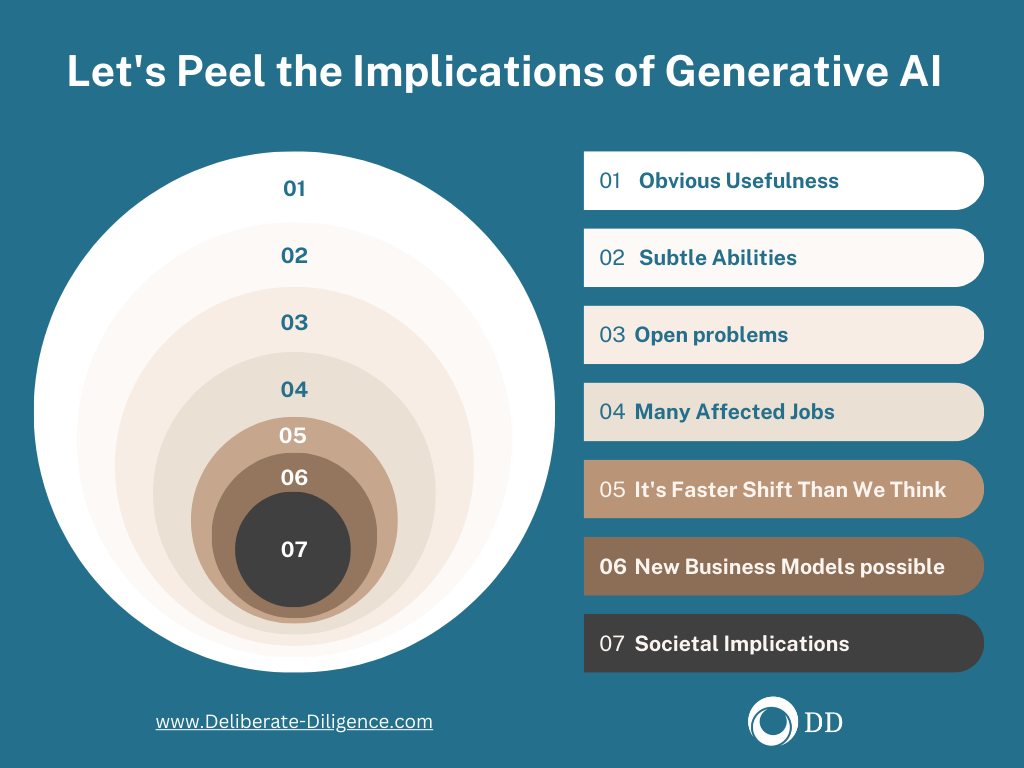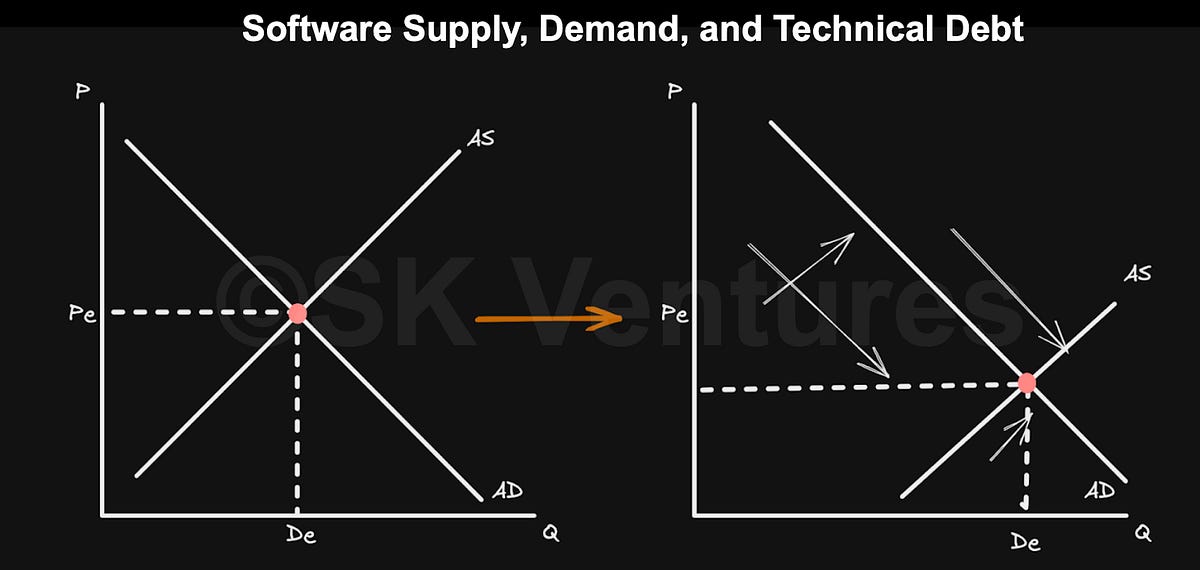Navigating the Shift to Generative AI: Insights on How to Stay Ahead of the Game
Explore the far-reaching implications of Generative AI and Large Language Models on businesses, job markets, and society as we uncover the layers of understanding and anticipate the transformative changes ahead.

💼 Level 06: "Rise to the Top" (career tips)
🌇 Level 10: "Build Your Own Empire" (entrepreneurship)
Topic: Generative AI
I often think about Jeff Bezos' biography. In the early 90s, Bezos worked at a hedge fund called DE Shaw, where he recognised the untapped potential of the Internet for commerce. By connecting the dots between the book market and commerce, he saw an opportunity to create his own venture in E-Commerce. This led him to found Amazon, which has since become one of the most successful companies in the world. It's impressive to think about how Bezos was able to foresee the future of online shopping and take action to make it a reality.
Looking back, people often reminisce about the 1990s or the dot com time in the 2000s and wish they had been in their 30s and ready to act (with strength, capital, and education) to join the gold rush.
But would we have recognised that opportunity back then? The clarity, simplicity, and obviousness we see today were absent. The internet could have turned out to be useless hype.
I firmly believe that we are on the brink of a transformative era. There is an upcoming shift that has yet to be fully comprehended by the majority of individuals, and it has the potential to be advantageous for those who can anticipate and plan for the changes that lie ahead. By thinking forward and considering the potential consequences of this shift, you can position yourself ahead of the curve and gain a competitive advantage over the majority.
I am referring to the advancements in AI, particularly Generative AI and Large Language Models (LLMs), that have far-reaching impacts that may exceed your current awareness. These cutting-edge technologies, such as ChatGPT and GPT-4, can generate text, while others, like Midjourney V5, can produce stunning images. The potential of these innovations is truly remarkable and will continue to shape the future of technology.
I won't explain the basics of both technologies since you've probably already been bombarded with news and social media about them. Instead, I want to discuss the potential consequences and implications.
As the Head of Innovation for a large IT Service Provider, I have spent years integrating cutting-edge technologies like GPT into businesses' value creation. Despite working with these technologies daily, it wasn't until recently that I fully recognised the vast implications they hold.

1st Layer: The Obvious Usefulness
The first layer is what most people see on the spot: Generative AI can generate text, images, and videos. People try out the tools and immediately recognise their usefulness ("great, I can have creative texts written; a real work relief") and dangers ("Oh, what will students do with this?")
However, most people's imagination often only extends as far as "Oh, I can also generate recipes with this."
2nd Layer: The Subtle Abilities
The second layer of technology involves generating, transforming, and drawing intelligent conclusions from content with combinatorial capabilities.
As a knowledge worker, combining information from multiple sources into a comprehensive concept has always been my strength, and it's a big part of my job.
The 2nd layer's recognition is: "Hmh, interesting! If you think about it further, it could actually do creative and combinatorial parts of my job."
For a simple example: the wordplay "Deliberate Diligence" was completely unused before I started this blog. Google found no search results for it, thinking it was about a misspelt "Due Diligence."
However, when I asked ChatGPT for the definition of Deliberate Diligence, a description came out exactly as I intended the meaning:
Deliberate diligence refers to a way of working where one is purposeful and focused in order to achieve a specific goal. It involves setting clear objectives, planning the necessary steps, and working diligently and attentively to achieve those goals. Deliberate diligence is a combination of intentional action and a systematic approach to achieving success.
Reasoning and combinatorial skills are just an example. Another subtle abilities one could discover in GPT is that it can write software code.

3rd Layer: The Open Problems
Peeling the onion further, one encounters a somewhat rotten layer:
- The AI outputs are indeed quite repetitive
- Legal issues such as licensing and data protection rights are unclear
- The technology is not surprisingly new; instead, it's a chain of incremental innovations now surfacing in society
- Texts often lack detail and depth
- The quality of the texts is average, and they don't evoke "wow" effects from readers.
After discovering this onion layer, many dismiss the entire "onion", thinking, "Oh, it's just another hype."
4th Layer: It May Affect Many Jobs
In the fourth layer, one realises that technology should not be viewed linearly but exponentially.

This means GPT-5 and GPT-6 will not be just a few percentage points better than GPT-3 or GPT-4; they will be four or even ten times better than their predecessors. One can see where such developments have led, with the rapid and sudden shift from bulky PCs in the 2000s to the ubiquitous slim smartphones of the 2010s.
As for the impact of AI on society, some people are starting to ponder it:
- An MIT author has written that GPT-augmented knowledge workers might be 35% more productive (or do we need 35% fewer knowledge workers?)
- The CEO of one of the world’s biggest media companies just said A.I. is making some journalists obsolete as he plans staff cuts.
- Only one in five developers will be needed (as rumoured among Tech CEOs; other studies say AI-augmented developers using tools like Copilot might be 1.5 times more effective).
Especially the last point is interesting. Thinking it through would mean that the marginal costs of software engineering would tend towards zero. That alone would create a massive wave of new business models (see also image and link below about "Software's Gutenberg Moment")


Regarding job fears, people often say:
It's not AI that takes away our jobs, but someone who uses and leverages AI will.
The core insight of the fourth onion layer is that companies will drop average and below-average workers (due to the usual relentless cold commercial logic). In contrast, above-average workers who embrace AI augmentation early will experience a golden age of productivity.
Generative AI is expected to have far-reaching implications for various industries, including enterprise software, healthcare, and financial services. The technology can streamline business workflows, automate routine tasks, and create a new generation of business applications.
Software companies are already incorporating generative AI into their product portfolios. Software-as-a-service firms use it to open opportunities for upselling and cross-selling products, increasing customer retention and expansion. Generative AI can also enhance office productivity and sales efforts, design buildings and manufactured parts, improve patient diagnosis in healthcare settings, and detect cyber fraud.
Social and manual labour jobs remain primarily unaffected as progress in these areas proves too challenging.
However, insane advances are also happening in robotics.
5th Layer: It's Happening Faster Than We Think
Even with the understanding from the fourth onion layer, one might think, "Well, it will take some time, and we can adapt." Honestly, I'm not so sure about that. This might be a misconception.
Since the release of ChatGPT, a race among capital-backed tech giants has broken out, with all of them rushing to integrate the Generative AIs into their products – Microsoft leading the charge.
The influx of fresh capital into the foundational technology will lead to even faster improvement iterations. This was somewhat evident with the transition from GPT-3.5 to GPT-4 – as soon as people got familiar with GPT-3.5, version 4 was released.
In a SaaS-driven world, adoption will happen quickly. Once GPT is integrated into Microsoft Office products and activated, it will be there. The productivity boost for knowledge workers will happen almost overnight, and societal effects will be visible within months.

The same goes for software developers: once AI tools are integrated into IDEs and iteratively improved. There's no turning back at that point.
6th Layer: Commercial Implications - New Types of Business Cases Become Possible
Many people have reached the sixth layer of the onion in their thoughts. However, the consequences are only apparent to those who have developed business plans in a business context before.
In the current AI rush, it's common for entrepreneurs to focus on building apps using Large Language Models (LLM) like GPT. Still, they often only configure the prompts and make the AI more accessible.
This approach may be shortsighted because it could be overtaken by the underlying technology, which is continuously improving its usability through features such as plugin capabilities in GPT-4. Additionally, foundational tools like Office and Adobe are integrating AI technology, making it even more accessible and ubiquitous.
Therefore, it's important for entrepreneurs to consider the long-term implications of their business models and stay up-to-date with the latest advancements in AI technology.
When you summarise the insights from Onion layers 1-5, you quickly realize that a golden age is coming for business leaders and innovators.
Why? Because innovation has been really expensive. In the technical, professional, and procedural areas, knowledge workers are needed for every innovation and business strategy and cost a lot of money.
Summing up salaries and other organisational/structural costs can easily amount to 750-1000 euros per day for a highly skilled full-time employee.
And then, you try to calculate an investment where five knowledge workers and programmers build a Minimum Viable Product (MVP) for six months (=€450k), uncertain whether it will ever generate revenue. Unaffordable!
Only the most profitable companies and risk-savvy managers make these kinds of innovations.
That's precisely why large corporations struggle with innovation and have largely left the field to startups, which can innovate more cheaply due to lower structural costs.
Large language models (LLMs) are set to revolutionize software development and knowledge work. Although they won't eliminate the costs associated with these fields entirely, they will significantly reduce them. This is because LLMs will serve as tools for augmentation rather than automation, resolving the resource bottlenecks that have hindered progress in data science and programming.
This has some exciting implications for the B2B markets:
- Companies will no longer rely on off-the-shelf commodity software solutions like CRM or ERP systems. Instead, they can invest in tailor-made software that meets their specific needs.
- Data science and software engineering will be more accessible to ordinary professionals, thanks to GPT which can simplify user interfaces to much more complex systems (see, for example, ChatGPT's Wolfram Alpha Plugin).
- Cloud-native custom development will experience a renaissance as companies no longer need to rely on large service providers with offshoring locations. This trend will likely bring back smaller web design agencies and system houses that can supply small businesses with customized solutions.
- Companies will have more room for experimentation and creativity. With lower marginal costs for development and knowledge work, B2B innovation is likely to accelerate by a factor of 10 or more.
- Startups may no longer be necessary for rapid innovation, as larger corporations can innovate more easily and quickly thanks to LLMs. This solves the old innovation dilemma faced by large corporations.
- LLMs are essentially the long-promised NoCode and Robotic Process Automation tools that can revolutionize companies' operations.
Additionally, entirely new business models will become possible, and they are already starting to emerge.
Here's a small example to make it more tangible. In content creation, "lead magnets" traditionally enticed users to register for newsletters or purchase products by offering standardized eBooks (=one offer for all). Today, NoCode forms collect data from potential customers, enabling Large Language Models (LLMs) to deliver tailored responses, suggestions, and work samples within seconds. This efficiency is achieved as generative AI handles each case, significantly reducing costs to mere cents per request.

7th Layer: Societal Implications
Well, the seventh onion layer gets interesting. When you add up what will happen in companies - from large to small (and in all of them simultaneously) - you encounter some intriguing phenomena:
- Millions of knowledge workers will be freed up. What this means is still unclear to me. We will need as many as we would have needed due to demographic change (e.g., teacher shortages, etc.), or a time of unemployment and part-time work may be upon us.
- Craft and social professions will become a safe haven, but more people will pursue these career paths, meaning increased competition could emerge.
Goldman Sachs recently published a report on generative AI, specifically GPT, and its potential impact on society. According to the report, generative AI can increase global GDP by 7%, equivalent to almost $7 trillion, and improve productivity growth by 1.5% over a decade.
The report also warns that generative AI could expose 300 million full-time jobs to automation, and two-thirds of US occupations are exposed to some degree of automation. While the impact on the labour market will be significant, the report argues that most jobs and industries will only be partially exposed to automation and are more likely to be complemented rather than substituted by AI ("AI-Augmentation").
On the positive side, creating new jobs has historically offset the displacement of jobs by automation. For example, technological innovations created new occupations such as webpage designers, software developers, and digital marketing professionals. The report states that the technology-driven creation of new positions explains more than 85% of employment growth over the last 80 years.

Final Thoughts: Relevance for you
In conclusion, the potential impact of Generative AI and Large Language Models on society, the economy, and our daily lives is enormous. We are on the brink of a new era with far-reaching implications, and it's essential to consider how these technologies can affect you, your career, and your business.
Here are some suggestions to help you stay ahead of the curve:
- Embrace AI and explore its applications: Familiarize yourself with AI technologies, particularly Generative AI and LLMs. Understand how they can be applied in your industry and consider how they may affect your job or business in the future.
- Invest in lifelong learning: To remain competitive in the job market, invest in continuous learning and upskilling. Focus on acquiring skills complementing AI, such as creativity, critical thinking, and problem-solving.
- Diversify your skills: Develop a broad range of skills and competencies, including technical and soft skills. This will increase your adaptability in the face of AI-driven changes and create a more secure career path.
- Leverage AI to your advantage: Use AI tools to augment your productivity, enhance decision-making, and unlock new opportunities. By embracing AI, you can improve your performance and stay ahead of your peers.
- Stay informed: Keep up to date with the latest developments in AI. By staying knowledgeable, you can anticipate changes in your industry and adapt accordingly.
- Encourage responsible AI use: Advocate for ethical and responsible AI practices within your organization and industry. Ensuring that AI is used responsibly and transparently can help mitigate potential risks and maximize benefits.
The rise of Generative AI and Large Language Models presents challenges and opportunities alike. By understanding the potential implications of these technologies and positioning yourself to take advantage of them, you can ensure that you remain competitive and relevant in the rapidly evolving world of work.
Remember, just as Jeff Bezos foresaw the potential of e-commerce in the 1990s and acted accordingly, you can recognize the potential of AI and adapt to the changes it brings. It is up to you to seize the opportunity and navigate the transformative era that lies ahead.copy
In light of the profound implications of AI advancements, I plan to carefully review my investment portfolios, specifically identifying stocks at risk due to the changing landscape, such as commodity software services. I also aim to avoid investing in companies and startups that rely heavily on scaling knowledge workers at low costs.
To capitalize on innovation opportunities, I will focus on identifying previously unattainable business models held back by the high costs or slow pace of knowledge work. This is where the true potential for innovation lies in the age of AI.
By exploring this line of thought, we may uncover the next Jeff Bezos moment, as mentioned earlier.
Feel free to add tips and thoughts to this page's comment section, Twitter or LinkedIn!
Best regards,
-- Martin from Deliberate-Diligence.com


Discussion